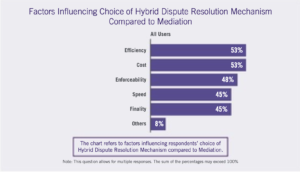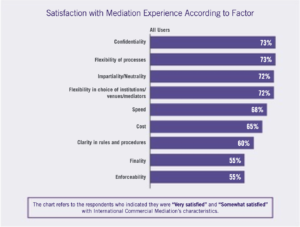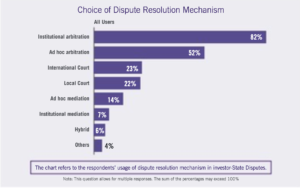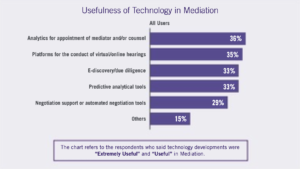The Singapore International Dispute Resolution Academy (“SIDRA”) issued the global International Dispute Resolution Survey: 2020 Final Report (the “SIDRA Survey”) on 3 July 2020, which studied the preferences, experiences, and perspectives of legal users (lawyers and legal advisers) and client users (corporate executives and in-house counsel) with regard to, among other mechanisms, international commercial mediation. Previous blogs have commented on the Survey findings. The SIDRA Survey was followed by a qualitative study conducted between November to December 2020, consisting of in-depth interviews held with 18 Legal Users and Client Users from 11 countries (“SIDRA Interviews”). This post focuses on some findings from the SIDRA Interviews on international commercial mediation – specifically its relationship with hybrid mechanisms, its use in investor-State disputes and the potential for technology to change mediation practice.
Hybrids vs Mediation.

Source: 2020 SIDRA Survey, Exhibit 9.2.3
According to SIDRA Survey data, the main factors influencing a preference for hybrid dispute resolution mechanisms over standalone mediation were improved efficiency (53%), cost (53%), and enforceability (48%). The results on enforceability to some degree are a response to perceived disadvantages of standalone mediation, with enforceability and finality ranking as the bottom two factors (both 55%) in terms of user satisfaction for mediation. As the Singapore Convention on Mediation, a framework for the enforcement of international mediated settlement agreements, becomes more widely recognised, even more emphasis is likely to be placed on efficiency and cost as determining factors when choosing a hybrid mechanism over standalone mediation.

Source: 2020 SIDRA Survey, Exhibit 7.1.3
Hybrid processes were deemed to have the most to offer in terms of efficiency and cost, compared to other standalone mechanisms. During the SIDRA Interviews, interviewees indicated a reluctance to be the first party to propose mediation, as doing so was perceived to weaken their bargaining position, particularly where arbitration proceedings have already commenced. At the recent UNCITRAL WGIII Pre-Intersessional Meeting, it was suggested that having cues throughout the hybrid process to act as triggers for mediation might circumvent such situations, encouraging mediation. Interviewees further noted that the threat of hard sanctions through arbitration that hangs over mediation proceedings in hybrid procedures acts as an effective incentive, inducing parties to achieve settlement. Hybrid processes create synergies between the mediation and arbitration stages to encourage settlement at mediation, thereby making dispute settlement more efficient and less costly.
Critics are nonetheless wary of the conflict of interest issues that potentially arise for neutrals switching hats in a hybrid process. One key concern is that information from ex parte communications or other factors from the mediation stage, such as one party being more forthcoming during settlement negotiations, might impact the impartiality of the neutral who is later tasked to decide the arbitral stage of proceedings as well. Some interviewees also felt that these issues put awards at risk of being overturned, particularly where the hybrid clauses were poorly drafted. One also noted the field’s need for ethical competence standards specific to neutrals presiding over hybrid processes involving both mediation and arbitration. The 2021 SIDRA Survey will seek to gain further insights on user satisfaction in same-neutral hybrid processes.
Mediation in Investor-State Dispute Settlement (ISDS)

Source: 2020 SIDRA Survey, Exhibit 5.1.1
Mediation (14% for ad-hoc mediation, and 7% for institutional mediation) and hybrid mechanisms (6%) remain the least-used dispute settlement mechanisms for resolving investor-State disputes. This is despite the ongoing drive to encourage mediation in ISDS – UNCITRAL WGIII had identified it as an area for reform in ISDS, and the IBA had published its Rules for Investor-State Mediation back in 2012.
Investor-State disputes pose a slightly different dynamic from regular commercial disputes, and one reason for the relatively slow uptake of mediation in ISDS could be attributed to the issue of political accountability which arises where a State is party to a dispute. This cropped up as a common theme across the SIDRA Interviews – among the issues raised included government authorities’ reluctance to take political responsibility for settlements, and decision-making power for settlement not being concentrated in one individual in government. Whilst arbitration decisions are rendered by a third party, settlements are agreed upon by the parties to the dispute and so the State bears political responsibility.
It is perhaps this desire for the perception of the dispute resolution process being taken out of parties’ hands that drives some States to support mandatory mediation in ISDS. Notably, some interviewees also suggested that incorporating neutral evaluation into the dispute resolution process may make it easier for States to justify decisions to mediate, therefore facilitating settlement. Although mandatory mediation and neutral evaluation are seen to impinge on the principle of party autonomy that mediation is traditionally associated with, States might be more accommodating where ISDS is concerned as these procedural features reduce perceptions of political responsibility for settlement decisions. Whilst investor-State mediation is certainly gaining more attention, these structural difficulties will need to be addressed and resolved before it can properly be put into practice.
Mediation and Technology
The SIDRA Survey (pre-Covid) suggested there was not a high interest in the use of technology in international commercial mediation, with users ranking analytics for appointment of mediator and/or counsel (36%) and virtual/online hearings (35%) as the technology developments that were most useful in mediation.

Source: 2020 SIDRA Survey, Exhibit 7.4.1
In the post- Covid SIDRA Interviews, users shared their online experiences and the responses were mixed. (This contrasts with survey findings from Independent Mediators) . One interviewee spoke about the exciting potential of utilizing artificial intelligence to process publicly-available data of mediator and/or counsel candidates to produce psychometric profiles and aid parties’ decision-making process. However, such technologies are as yet not widely recognised and used, and unlike platforms which aggregate feedback from stakeholders directly involved in the disputes process (parties, in-house counsel, outside or external counsel, and third-party funders), analytics which derive data from publicly-available sources may be more prone to manipulation and pose additional ethical issues.
Another interviewee commented that online mediation, which has seen greater uptake during the Covid-19 pandemic, was a poor substitute for in-person mediation and fails to replicate the latter experience. Examples of online mediation being conducted solely by audio conferencing, or worse by “shuttle diplomacy”, were cited as contributing to less effective mediation processes. As Ana Goncalves and Dan Rainey have posted, it’s more than just doing it on Zoom. These issues suggest that technology is at a crossroads in terms of how it is being integrated into mediating cross-border disputes.
SIDRA Survey 2021
The international dispute resolution landscape is constantly evolving. Hybrid processes are slowly gaining traction, ICSID is in the process of designing its own set of mediation rules and engaging in capacity-building, and Covid-19 has precipitated an unprecedented shift to dispute resolution processes being conducted online. The 2021 SIDRA Survey will seek to understand how these changes have impacted users’ attitudes and experiences in international dispute resolution.
The 2021 SIDRA Survey calls for responses from lawyers, legal advisers, in-house counsel and corporate executives with experience in international commercial disputes (international arbitration, mediation, hybrid mechanisms, litigation, and investor-State disputes). The SIDRA Survey 2021 will examine and study users’ perspectives, preferences, and experiences in international dispute resolution during 2019-2020 and provide the findings in the second half of this year. The 2021 SIDRA Survey is available in 6 languages (English, French, Spanish, Mandarin Chinese, Russian and Arabic) and will be open until 16 May 2021.
________________________
To make sure you do not miss out on regular updates from the Kluwer Mediation Blog, please subscribe here.


